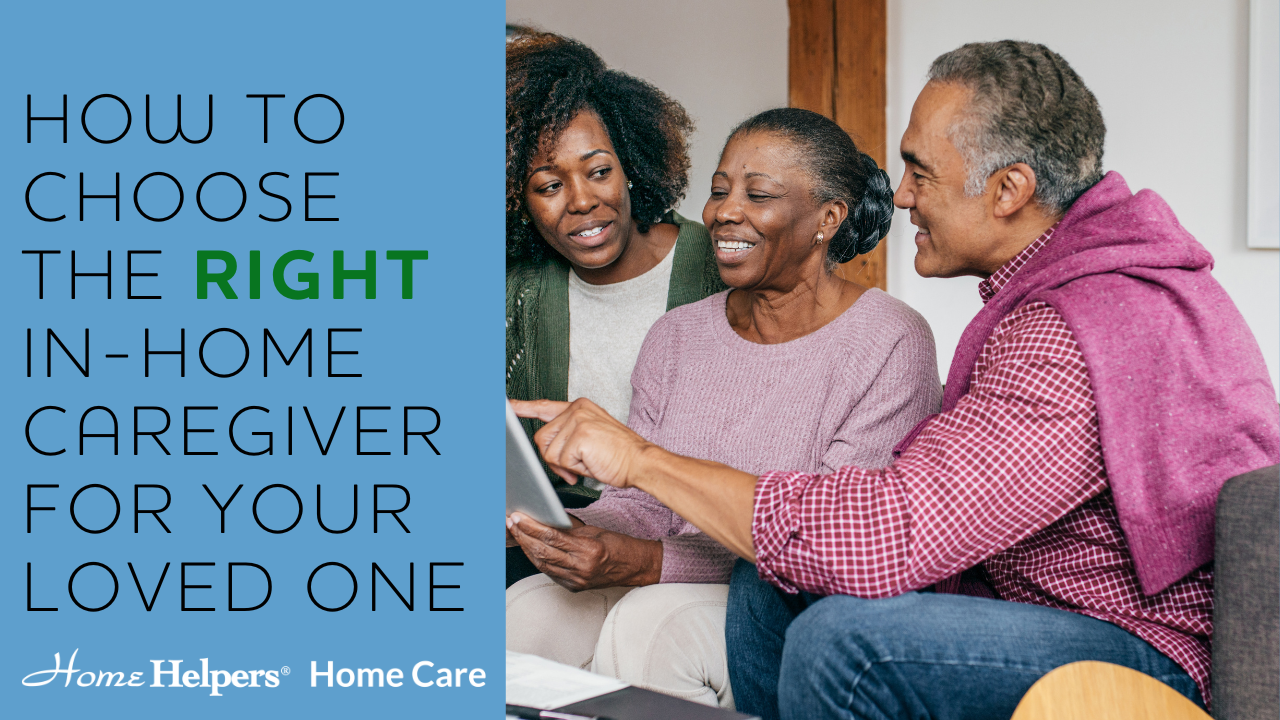How to Choose the Right In-Home Caregiver for Your Loved One

Author: Home Helpers Home Care
How to Choose the Right In-Home Caregiver for Your Loved One
Choosing the right in-home caregiver for your loved one is a critical decision that can significantly impact their quality of life. The right caregiver provides not only the necessary physical assistance but also emotional support and companionship. Here are some key considerations and steps to help you choose the right in-home caregiver.
1. Assess Your Loved One’s Needs
Before starting the search, clearly define your loved one’s care needs. Consider the following:
- Personal Care: Assistance with bathing, dressing, grooming, and toileting.
- Medical Needs: Administration of medications, monitoring health conditions, and managing medical equipment.
- Mobility Assistance: Help with walking, transferring, and using mobility aids.
- Companionship: Providing social interaction and emotional support.
- Household Tasks: Light housekeeping, meal preparation, and grocery shopping.
2. Determine the Type of Caregiver
There are different types of in-home caregivers, each with varying levels of expertise and qualifications. These include:
- Companion Caregivers: Provide companionship, light housekeeping, and help with daily activities. They do not perform medical tasks.
- Home Health Aides (HHAs): Offer personal care and basic medical assistance, such as monitoring vital signs and administering medications.
- Certified Nursing Assistants (CNAs): Provide more advanced medical care under the supervision of a registered nurse.
- Licensed Practical Nurses (LPNs) or Registered Nurses (RNs): Offer skilled medical care, including wound care, injections, and managing complex medical conditions.
3. Set a Budget
Determine your budget for in-home care services. Costs can vary depending on the type of caregiver, the level of care required, and the number of hours needed. Consider potential funding sources, such as insurance, Medicaid, or veterans’ benefits.
4. Choose a Reputable Home Care Agency
Working with a reputable home care agency can simplify the process of finding a qualified caregiver. Agencies typically handle background checks, training, and payroll. When choosing an agency, consider the following:
- Licensing and Accreditation: Ensure the agency is licensed and accredited by relevant authorities.
- Reputation: Look for reviews, testimonials, and recommendations from other families.
- Services Offered: Confirm that the agency provides the specific services your loved one needs.
- Staffing Policies: Ask about the agency’s hiring process, caregiver training, and supervision.
5. Conduct Interviews
Interview potential caregivers to assess their qualifications, experience, and compatibility with your loved one. During the interview, consider asking the following questions:
- Experience and Training: What is your background and training in caregiving? Do you have experience with specific conditions or tasks relevant to my loved one’s needs?
- Certifications and Licenses: Do you hold any relevant certifications or licenses?
- Availability: What is your availability? Are you able to work the hours and schedule we require?
- Approach to Caregiving: How do you handle challenging behaviors or situations? What is your approach to providing emotional support?
- References: Can you provide references from previous clients or employers?
6. Check References and Background
Always check the references provided by potential caregivers and conduct thorough background checks. Verify their employment history, qualifications, and any certifications or licenses. A reputable home care agency will typically handle these checks for you.
7. Monitor the Caregiver’s Performance
Once you’ve chosen a caregiver, monitor their performance closely, especially during the initial period. Ensure they are meeting your loved one’s needs and providing the level of care expected. Regular communication with the caregiver and your loved one is essential to address any issues or concerns promptly.
8. Maintain Open Communication
Maintain open and ongoing communication with the caregiver. Provide clear instructions and feedback to ensure your loved one’s care plan is followed correctly. Regularly check in with your loved one to gauge their satisfaction and comfort with the caregiver.
How Home Helpers Home Care Can Support You
Home Helpers Home Care offers professional in-home care services with a focus on personalized and compassionate care. Our services include:
- Comprehensive Care Plans: Tailored to meet the unique needs of your loved one.
- Qualified Caregivers: Carefully selected, trained, and supervised to provide high-quality care.
- Support and Monitoring: Regular check-ins and updates to ensure the satisfaction and well-being of your loved one.
- Flexible Services: Offering a range of services from companionship to skilled nursing care.
Our goal is to provide peace of mind by ensuring your loved one receives the best possible care from dedicated and professional caregivers.
Conclusion
Choosing the right in-home caregiver is essential for ensuring your loved one’s well-being and quality of life. By assessing needs, setting a budget, conducting thorough interviews, and maintaining open communication, you can find a caregiver who meets your loved one’s needs and provides compassionate care. Home Helpers Home Care is here to support you through every step of the process, ensuring your loved one receives the best care possible.
For more information on how Home Helpers Home Care can support your family, visit our website or contact us directly.
#HomeHelpersHomeCare #WeAreHomeHelpers
Sources:
- AARP. (2023). How to Hire a Home Health Aide. Retrieved from www.aarp.org
- National Institute on Aging. (2023). Hiring In-Home Help. Retrieved from www.nia.nih.gov
- Mayo Clinic. (2023). Home Care Services: Questions to Ask. Retrieved from www.mayoclinic.org
